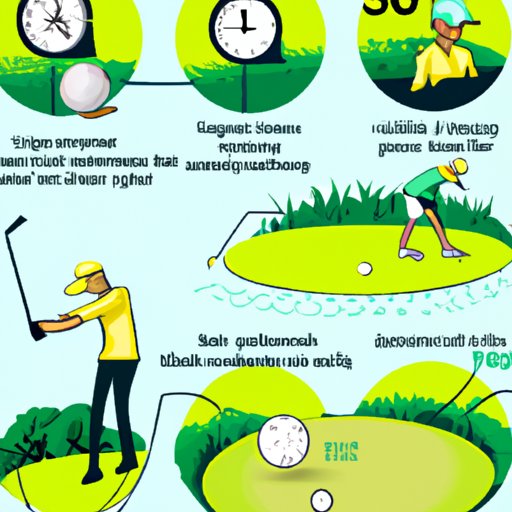An Overview of the Average Length of a Round of Golf
Golf is a great way to spend time outdoors, enjoy some exercise, and socialize with friends. But how long does a game of golf take? The answer to this question depends on a few factors, including the number of players, course difficulty, and pace of play. On average, an 18-hole round of golf takes about 4 hours to complete. However, there are ways to reduce or increase the playing time depending on the preferences of the players.

Factors That Influence How Long a Game of Golf Takes
The average length of a round of golf can be affected by several factors, including:
Number of Players
The number of players in a group can have a big impact on the total playing time. A foursome typically takes more time than a threesome or twosome, as there are more people hitting shots and waiting for their turn. It is important for groups to establish a pace of play before starting the round so that everyone is aware of the expected time frame.
Course Difficulty
The difficulty of the course being played also affects the total playing time. Courses with longer holes, more hazards, and larger greens tend to take longer to play than courses with shorter holes, fewer hazards, and smaller greens. Additionally, courses with undulating terrain can add time to a round since it can be difficult to find balls that have gone astray.
Pace of Play
The pace of play is one of the most important factors that influences the length of a round of golf. Slow play can cause rounds to drag on for hours, while fast play can help keep things moving and reduce the total playing time. It is important for groups to agree on a pace of play before starting the round and then stick to it throughout the day.
Strategies to Speed Up or Slow Down a Game of Golf
Depending on the preferences of the players, there are a few strategies that can be used to speed up or slow down a game of golf. Here are some ideas for speeding up or slowing down the game:
Ways to Speed Up Play
- Play ready golf
- Keep up with the group ahead of you
- Use a cart instead of walking
- Stay focused and limit distractions
- Prepare your shot while others are hitting
Ways to Slow Down Play
- Walk the course instead of using a cart
- Take your time between shots
- Allow extra time for difficult shots
- Focus on your form and technique
- Enjoy the scenery and take breaks
Tips for Beginner and Experienced Golfers to Reduce Playing Time
Beginners and experienced golfers alike can benefit from following a few simple tips to reduce their playing time. These tips can help make sure that each round is enjoyable and not overly long.
Tips for Beginners
- Practice at the driving range before playing a full round
- Be prepared for each shot before it is your turn
- Hit only when you are ready
- Always be aware of where the group ahead of you is
- Keep up with the pace of the group
Tips for Experienced Golfers
- Choose the right club for each shot
- Know the distance of each shot
- Allow extra time for difficult shots
- Make sure to replace divots and rake bunkers
- Don’t waste time searching for lost balls

The Benefits of Taking Your Time on the Course
While it is important to keep up with the pace of play, it is also important to take your time and enjoy the game. Taking your time on the course can provide both mental and physical benefits, such as:
Mental Benefits
- Reduced stress levels
- Better focus and concentration
- Improved problem solving skills
- Increased enjoyment of the game
Physical Benefits
- Improved flexibility and balance
- Better coordination and body control
- Increased strength and endurance
- Decreased risk of injury

The Impact of Course Design on Golfing Time
The design of the course can also have an impact on the length of a round of golf. Some of the key elements of course design that can affect playing time are:
Hazards
Courses with more hazards tend to take longer to play since it can be difficult to navigate around them. Water hazards and bunkers can also add time to a round if players are unable to hit out of them successfully.
Greens
Larger greens tend to take longer to putt since they require more strokes to complete. Smaller greens can help speed up play since they require fewer strokes to complete.
Tees
Longer tees tend to take longer to play since it takes more time to hit the ball. Shorter tees can help speed up play since it takes less time to hit the ball.
Fairways
Narrow fairways tend to take longer to play since it can be difficult to hit the ball accurately. Wide fairways can help speed up play since it is easier to hit the ball accurately.
Conclusion
The length of a game of golf can vary depending on several factors, including the number of players, course difficulty, and pace of play. Additionally, course design can also have an impact on the total playing time. By following a few simple strategies and tips, golfers of all skill levels can reduce their playing time while still enjoying the mental and physical benefits of taking their time on the course.


